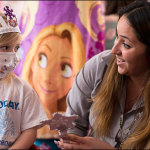February 8, 2016

Bench and Bedside is a digest of the previous month’s stories about the clinical and academic activities of our physicians and scientists. We welcome your submissions and feedback.
January 5
Zoghbi to receive Vanderbilt prize in Biomedical Science
 Dr. Huda Zoghbi, professor of molecular and human genetics at Baylor College of Medicine, and director of the Jan and Dan Duncan Neurological Research Institute at Texas Children’s, will be honored with the 2015 Vanderbilt Prize in Biomedical Science. This award is given by the Vanderbilt University School of Medicine to recognize women scientists with a stellar record of research accomplishment who have also mentored other women in science. More
Dr. Huda Zoghbi, professor of molecular and human genetics at Baylor College of Medicine, and director of the Jan and Dan Duncan Neurological Research Institute at Texas Children’s, will be honored with the 2015 Vanderbilt Prize in Biomedical Science. This award is given by the Vanderbilt University School of Medicine to recognize women scientists with a stellar record of research accomplishment who have also mentored other women in science. More
January 5
Second location of The Center for Children and Women celebrates milestone
 Texas Children’s Health Plan recently celebrated the first anniversary of The Center for Children and Women in Southwest Houston. During the past 12 months, the Center has provided care to more than 5,800 patients, including 356 births, demonstrating The Center’s remarkable footprint in the community. More
Texas Children’s Health Plan recently celebrated the first anniversary of The Center for Children and Women in Southwest Houston. During the past 12 months, the Center has provided care to more than 5,800 patients, including 356 births, demonstrating The Center’s remarkable footprint in the community. More
January 12
Dr. Sanjeev Vasudevan selected for Baylor Young Alumni Award
Dr. Sanjeev Vasudevan will receive the 2016 Young Alumnus Award from the Baylor College of Medicine Alumni Association. Vasudevan is a pediatric surgeon and researcher specializing in pediatric cancers such as neuroblastoma, liver cancer, renal tumors and sarcomas. More
January 12
Harpavat receives ASSLD award for study on newborn screening tool to detect biliary atresia earlier
Dr. Sanjiv Harpavat, a pediatric gastroenterologist at Texas Children’s and Baylor College of Medicine, received the 2015 Jan Albrecht Clinical and Translational Research Award in Liver Diseases from the American Association for the Study of Liver Diseases (AASLD) Foundation. His study titled, “Assessment of a Novel Newborn Screening Tool for Biliary Atresia,” explores a new strategy to detect infants with biliary atresia earlier. More
January 12
Pediatric Surgeon Dr. Sundeep Keswani awarded visiting professorship
Dr. Sundeep Keswani, pediatric surgeon, was chosen by the Association for Academic Surgery to receive the 2016 International Visiting Professorship Award to attend the Columbia Surgical Association Congress in Bogota, Colombia, in August 2016. Keswani is the principal investigator for the Texas Children’s Laboratory for Regenerative Tissue Repair. More
January 12
Family Fertility Center advances innovative research to improve IVF process
 From exploring the metabolic factors impacting egg quality to the genetics of embryo implantation, Family Fertility Center researchers at Texas Children’s Pavilion for Women are engaged in several fascinating studies to help infertile couples achieve successful pregnancy outcomes. Read about the various studies in progress. More
From exploring the metabolic factors impacting egg quality to the genetics of embryo implantation, Family Fertility Center researchers at Texas Children’s Pavilion for Women are engaged in several fascinating studies to help infertile couples achieve successful pregnancy outcomes. Read about the various studies in progress. More
January 19
Three Texas Children’s Cancer Center researchers receive prestigious ASH awards
The American Society of Hematology (ASH) recognized three researchers from Texas Children’s Cancer Center and Baylor College of Medicine for their work in advancing our understanding of disease pathogenesis and exploring novel innovative approaches for the treatment of pediatric cancers. More
January 19
Texas Children’s uses advanced orthopedic imaging, less radiation exposure
 Texas Children’s is the first pediatric hospital in the southwest to offer advanced orthopedic imaging that provides full body, 3-D views of a patient’s bone structure using less radiation. Because of the low radiation dose, EOS imaging is beneficial for orthopedic patients with scoliosis and other spinal deformities who require frequent imaging to monitor disease progression. More
Texas Children’s is the first pediatric hospital in the southwest to offer advanced orthopedic imaging that provides full body, 3-D views of a patient’s bone structure using less radiation. Because of the low radiation dose, EOS imaging is beneficial for orthopedic patients with scoliosis and other spinal deformities who require frequent imaging to monitor disease progression. More
January 26
Texas Children’s Hospital welcomes expert pediatric hand surgeon
Texas Children’s Hospital is excited to welcome Dr. William Pederson, a highly-regarded pediatric hand surgeon, to the Department of Surgery. Pederson, whose appointment was effective in January, also is a professor of surgery and pediatrics at Baylor College of Medicine. More
January 26
Texas Children’s Heart Center welcomes trio of cardiologists
Texas Children’s Heart Center has welcomed three new pediatric cardiologists to the team. Drs. Tobias Schlingmann, Betul Yilmaz and Justin Zachariah joined Texas Children’s in July. More
 Super heroes come in many shapes and sizes, and Texas Children’s Health Plan encouraged students to channel their inner super hero by protecting themselves and their families against the flu. Schools from eight school districts in Houston, Beaumont and the surrounding areas were invited to participate in a month-long super hero themed flu vaccination contest. The school in each district with the most students receiving the flu vaccination won a pizza party that included pizza and drinks. A portion of the drinks were provided by Kroger.
Super heroes come in many shapes and sizes, and Texas Children’s Health Plan encouraged students to channel their inner super hero by protecting themselves and their families against the flu. Schools from eight school districts in Houston, Beaumont and the surrounding areas were invited to participate in a month-long super hero themed flu vaccination contest. The school in each district with the most students receiving the flu vaccination won a pizza party that included pizza and drinks. A portion of the drinks were provided by Kroger.























